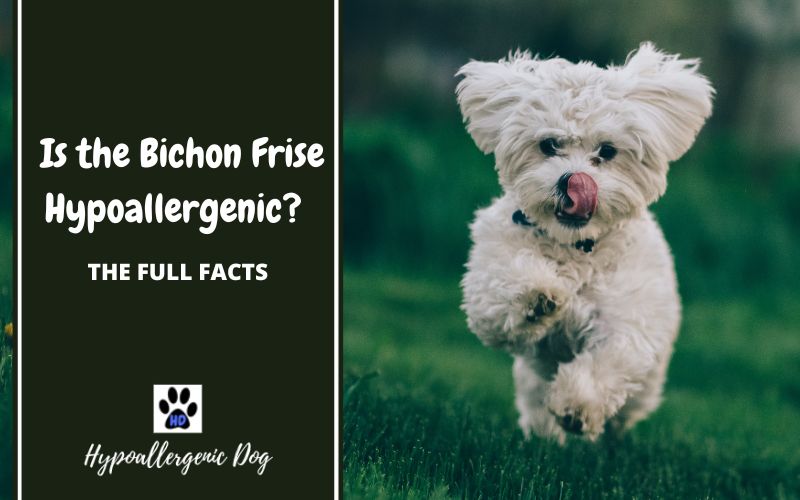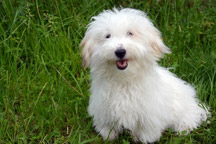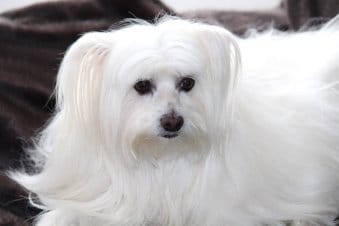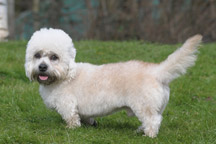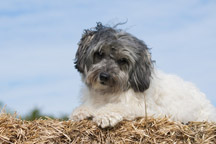Are Bichon Frise Hypoallergenic?
Yes! The Bichon Frise is a small hypoallergenic dog breed that hardly sheds or drools.
If you’re allergic to dogs, have no fear, the hypoallergenic Bichon Frise is here! (Sorry to be so clichè! We couldn’t help ourselves!) Also known as Bichón Tenerife and Bichon à poil fries, this breed is perfect for anyone who has pet allergies but is still an avid animal lover. Unlike an English Bulldog or a Golden Retriever, you’ll never have to worry about your Bichon producing being drooly or shedding a lot. Shedded fur, dog drool, and flaky skin called dander, are all major factors that can cause allergic reactions in people who have dog allergies. Thankfully, the Bichon hardly sheds at all! Although some people prefer to trim or shave their Bichon’s coat, you won’t have to vacuum like you do with other breeds, or worry about having clothes covered in dog hair. They don’t drool much, but if you’re allergic to dogs it can help to wipe their mouth occasionally to keep their fur saliva free. For a quick summary of the Bichon Frise, skip to our Bichon Frise Dog Breed Summary further down the page.
Are Bichon Frise Hypoallergenic Dogs? Contents
Bichon Frise Quick Facts
About the Breed
Bichon Frise Training and Exercise
Bichon Frise Grooming and Care
Bichon Frise Health
Conclusion
Bichon Frise FAQ
Bichon Frise Facts Summary
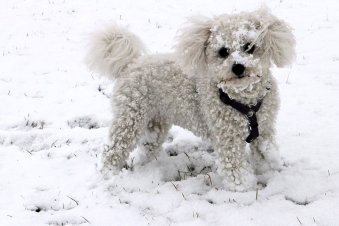
Bichon Frise Quick Facts
| Hypoallergenic Dog: | Yes! |
| Shedding: | Low shedding |
| Drooling: | Low |
| Size: | Small |
| Breed Group: | Companion |
| Lifespan: | 12 – 15 years |
| Energy Level: | Medium |
| Trainability: | Medium |
| Family Dog: | Yes, but be careful with young children. |
About the Breed
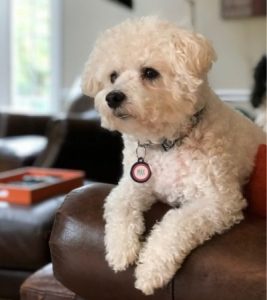
The Bichon Frise Physical Characteristics and Coat
(Skip this section) The hypoallergenic Bichon Frise has white, fluffy, corkscrew fur that feels very smooth and makes them resemble a big, puffy, adorable marshmallow. They are small, but they’re not considered a toy breed. The features of the Bichon are well balanced, and rarely show any of the characteristics common to toy or dwarfish dogs. Their snouts aren’t stubby, and their black button eyes, nose, and poofy ears are in excellent proportion. Their fluffy tail curls primly over their back, and seems to hardly ever stop wagging.
Their coat is double layered, and is basically non-shedding and low dander. When they do shed, those loose hairs often get stuck in their curly coat, rather than ending up on your furniture or clothes. To keep allergic reactions from happening, you should brush and bathe your Bichon Frise regularly so as to get rid of loose hair and dander.
Weighing between 6 and 12 pounds (3-5 kilos), and standing just 9 to 12 inches (23-30cm), this small dog has a big personality that graces it’s home with fun, love and affection.
Bichon Frise Temperament
The Bichon is a cheerful, happy go lucky, and affectionate pup. They are intelligent and charming and they love to play and be cuddled. This small dog responds well to training, but dislikes being left alone. They’re known have separation anxiety when they are left by themselves for too long. They do very well in apartments and are wonderful pets for children because of their sweet, gentle nature. They’re actually better for kids than many other dog breeds because they’re not too large or powerful, but they’re not so small that they’re too fragile to play with children. Not only are they the perfect size for kids, but they possess wonderfully sweet, playful dispositions that young family members are sure to love! Most members of this breed aren’t excessive barkers. However, when they do bark, their bark is somewhat of a high-pitched yap. They will alert you of intruders, but they can also become be very annoying. You should train your Bichon not to bark by following our training tips here! (coming soon). These dogs love to meet new people and are great for when you have company over.
Bichon Frise Training and Exercise
Encouraging Good Behavior In Your Bichon Frise
(Skip this section) Bichon Frise are intelligent dogs, who respond well to praise, attention and of course, treats! They are easier to train than a lot of dogs as they love to please you! Make sure you and your household agree on the rules that your Bichon should respect. Every member of the family should know how to gently reinforce the rules of the house, so your Bichon can be well adapted and enjoy being part of your family.
Although smart, the Bichon can be difficult to house train. Take them outside regularly to establish good habits from day one, but don’t keep them outside by themselves while you’re away. They like to wander and could end up miles down the road very quickly! You should always crate train your puppy. Crate training is a great way to help puppies adapt to potty training easily. It’s less stressful for them, and for you. Remember that your adult Bichon is likely to face situations where they will have to be in a crate later on in life – like if they need surgery, or if they need to be boarded, or if they end up getting lost and have to wait for you in an animal shelter. It’s much kinder to crate train your dog when they are young than for them to have to be frightened by crates when they’re older, and really need one. You won’t necessarily have to crate your Bichon when they’ve grown up, but as a puppy, a crate can keep them from getting into trouble and hurting themselves when you’re not in the house! Most owners claim that their dogs grow to love their crates as their own personal space! For tips on crate training your Bichon, please visit our Puppy Training Guide here (coming soon)! The cost and size of your crate will depend on the size and weight of your dog.
It is important to keep in mind that these small dogs don’t like to be left alone. If you work long hours a Bichon Frise may not be the right breed for you, unless you’re willing to hire a dog sitter or a dog walker. They suffer separation anxiety and need to be with their people. If you do happen to leave them alone for too long, your Bichon may bark a lot and become destructive. Be sure to provide them with lots of chew toys and ways keep them entertained while you’re out and about. Dogs are pack animals. Being alone makes this breed very anxious, so sometimes it may help to get a second Bichon Frise, or another hypoallergenic small dog as a friend. The more the merrier! Bichons are happiest when they are with you, so ensuring you include them in your daily activities is helpful in keeping your Bichon happy and fulfilled! Exercise Needs
Exercise Needs
While they do not need to go for long runs or hikes, this breed, like all dogs, still needs adequate exercise! A small yard with enough room to stretch their legs and run around is ideal, but not essential. Bichons enjoy daily walks, and playing games or lBearning new tricks! Sometimes challenging a dog’s mind can be just as tiring for them as a walk! A half hour walk is recommended for this small dog breed. That gives them the chance to fulfill their instincts to explore the world, and also to bond with you – their owner! Being highly intelligent and very agile, you will find your Bichon Frise will respond well to agility training. While providing great exercise and stimulation for your dog (and you!), it’s also a great opportunity for socialization with other people and dogs … and it’s fun!
Bichon Frise Grooming and Care
Maintaining Your Bichon Frise’s Coat
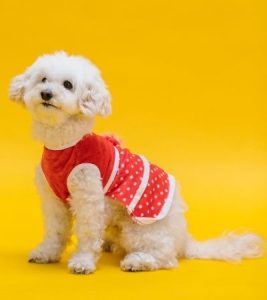
(Skip this section) Although they are low shedding dogs, the hypoallergenic Bichon still needs routine grooming to avoid developing matted hair. Brushing your dog regularly helps keep the coat free of loose hair, and dreadlock-like matts. Additionally, their coats need to be clipped every 4 to 6 weeks. You can do this yourself, but many people choose to find a local dog groomer to pamper their Bichon and maintain a neatly groomed coat.
Small white dogs frequently develop tear stains under their eyes as well, but this is something that can easily be removed! Simply clean the area beneath their eyes with a dampened cloth or paper towel.
When shampooing your Bichon, a special hypoallergenic or oatmeal based shampoo is recommended to soothe their skin.
This breed is notoriously allergic to the saliva of fleas; they absolutely must have some type of preventative, whether it is topical, oral or something as simple as a flea collar.
Teeth, Ears and Nails
Keeping nails trimmed is necessary for any breed, as is keeping their ears clean and brushing their teeth regularly. Brushing their teeth at least 2-3 times a week can prevent gum disease and tartar buildup. Doing so will also allow you to see any teeth that may be broken or missing. It’s especially important to maintain dental hygiene for breeds like the Bichon! These small dogs are more inclined to develop dental diseases. It addition to providing teeth brushing treats, you can also give your Bichon Frise bones to chew on. More importantly, you should brush your pup’s teeth once a week, and have their teeth examined by a vet once a year.
Health
Bichon Frise Health Issues and Care
Bichon Frise dogs are generally recognized as being a relatively healthy breed. They do tend to have some allergies and teeth issues, which can be managed with proper care and diet.
During the summer, microbes such as pollen and mold, as well as excess humidity and certain types of grass, can create an array of allergic reactions for the Bichon. Often times, they need to be put on a special diet to prevent further irritation. Things such as soy, gluten, cornmeal, chicken, and grain can cause a considerable amount of itching and irritation in some, Bichon Frise dogs – but that isn’t always the case. If your pup happens to scratch and bite at their skin, you may start to notice hot spots or patches of raw skin where fur is missing. If your Bichon is experiencing this, try a better quality food such as Canidae. You can also change the flavor of the food, as some dogs will develop allergies to certain types of meat.
You can learn more about Bichon Health from BichonHealth.org
Conclusion
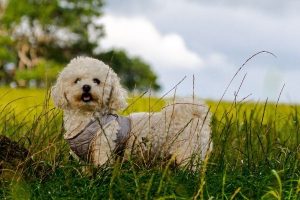
(Skip this section) If you’re considering getting a Bichon, keep in mind that they are a popular breed. The Bichon Frise is so well loved that they were voted the nation’s 25th most popular breed according to the American Kennel Club. This small non-shedding dog is easy to love. In addition to those of us with allergies, this breed is also excellent if you have a newborn in the home or are expecting a baby. Infants require a clean, bacteria free environment which is difficult with large, rambunctious dogs who are heavy shedders.
At the end of the day if you decide the Bichon Frise is not for you, there are plenty of other small hypoallergenic dogs out there for you to choose from. Give them a chance though, you may fall in love! To check out a similar dog, view our similar breeds list at the bottom of the page!
Bichon Frise FAQ
Do Bichon Frise Shed a Lot?
With the Bichon Frise, shedding is minimal and easy to manage. Their thick coat captures any loose hair and dander, trapping it until you brush the coat and remove it. This makes for an excellent solution for people looking for small dogs that don’t shed.
Are Bichon Frise Smart?
Yes! The Bichon Frise is a highly intelligent dog, with a personality keen to please. This makes them easy to train, and fun to work with.
Are Bichon Frise good family dogs?
Yes! These guys are excellent family dogs! They’re small, which means they are less at risk of hurting kids by accident, but they’re not quite so small and fragile that they can easily be injured.
Are Bichon Frise Popular?
Yes! They are small, friendly, playful, smart, energetic, and puppy-like! Not to mention – they’re not avid barkers like other small dogs. What’s not to like?
Are Bichon Frise Nippy?
Some owners report that their Bichons are sometimes nippy. While the breed itself isn’t known for nippiness, it’s important to take into account that these dogs are small – so they get scared more easily than larger dogs. If kids, or other dogs are rough with them, they may nip in self-defense! These nips are usually a Bichon’s way of “scolding” rather than attacking, so it’s unlikely they would cause any serious harm.
Bichon Frise Facts Summary
| Breed | Bichon Frise |
| Other Names? | Bichón Tenerife Bichon à poil frisé |
| Hypoallergenic? | Yes |
| Height | Male: 9–12 inches (23–30 cm) Female: 9–11 inches (23–28 cm) |
| Weight | Weight: Male: 6.6–11 lbs (3–5 kg) Female: 6.6–11 lbs (3–5 kg) |
| Lifespan | 12 to 15 years |
| Temperament | Affectionate, Playful, Gentle, Feisty, Cheerful, Sensitive, Happy |
| Colours | White (some have shades of cream or apricot) |
| Coat – describe the coat | Medium length, silky texture with corkscrew curls. |
| How much grooming? | Twice weekly brushing, coat trim every 4-6 weeks. |
| How much shedding | Non-shedding with proper grooming |
| Dander levels | Low dander level |
| Saliva – Do they Drool or Lick much? | Low |
| Energy levels | Medium |
| How much exercise do they need? | 30 minutes a day |
| Health problems | May suffer from allergies, urolithiasis (stones in the urinary tract), dental problems, heat stroke, hip dysplasia, and patellar luxation. |
| Good for apartment? | Yes, adapts well to apartment living. |
| Suitable for kids? | Yes, but they are delicate. |
| How much do they bark? | More than average |
| Can they be left alone? | Not more than a few hours |
| Intelligent? | Yes, Medium-high intelligence |
| Trainable? | Moderately trainable |
| How popular as a pet? | Very Popular |
| Any other important facts? | Bichon Frise is a French term. Bichon means lap dog, Frise means curly! |

